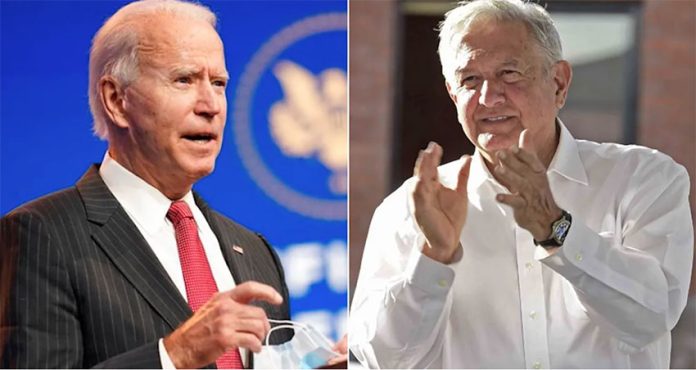President López Obrador said Saturday that he will ask his United States counterpart to legalize migratory flows of Mexican and Central American workers into the U.S.
Speaking at an event in Zacatecas, López Obrador said he will make the proposal at a virtual meeting with President Joe Biden on Monday, suggesting a scheme similar to the Bracero Program, under which millions of Mexicans worked legally on farms in the U.S. in the middle of the 20th century.
“I have a meeting with Biden on Monday and we’re going to look at this issue,” the president said, adding that he will tell the United States president that the U.S. needs Mexican and Central American workers to grow the economy and boost production.
“Mexico is the spark plug in North America due to the quality of work of Mexicans, their strength, their youth,” he said.
“… We’re going to put order to the migratory flow, legalize it, in order to provide a guarantee to the workers so that they don’t risk their lives,” López Obrador said, referring to the dangers migrants face when trying to cross into the United States illegally.

“If they don’t have Mexican labor how can a production increase be guaranteed in the United States?” he asked.
López Obrador said that economic development in Mexico so that “Mexicans can work and be happy where they were born, where their families are [and] where their culture is” remains a priority but acknowledged that there are people who want to leave their home towns and work elsewhere, including the United States.
“They should be able to do it, but legally, via an agreement. It’s one of the things that we want to raise with President Biden on Monday,” he said.
The establishment of an agreement allowing large numbers of Mexican and Central American manual workers to enter the United States legally would represent a monumental shift in U.S. immigration policy. During the administration of former president Donald Trump, the United States pressured Mexico to do more to stop the flow of migrants to its northern border and into the U.S. by threatening to impose blanket tariffs on Mexican goods.
Mexico responded by deploying the National Guard to ramp un enforcement against migrants, and cooperated with the United States’ Migrant Protection Protocols (MPP), the official name of a policy that forced U.S. asylum seekers to remain in Mexico as they awaited the outcome of their claims.
López Obrador’s remarks on Saturday come a day after United States Secretary of State Antony J. Blinken met virtually with Foreign Minister Marcelo Ebrard and Economy Minister Tatiana Clouthier.
The Foreign Affairs Ministry said in a statement that Ebrard and Blinken discussed regional development aimed at addressing the structural causes of migration.
Mexico and the United States agreed on a five-year development plan in December 2018 under which the former committed to investing US $25 billion in southern states and the latter pledged to provide $10.6 billion to Mexico, Guatemala, Honduras and El Salvador.
The Biden administration is revamping U.S. immigration policies – it is currently winding down the MPP – but it remains to be seen how responsive it will be to López Obrador’s proposal. Actively encouraging migrants to the border by establishing a program that welcomes them into the country to work would leave a new U.S. president — one seeking to bring unity — open to a backlash, especially from Republicans in Congress and other adherents of the “America First” doctrine championed by Trump.
Source: Sin Embargo (sp), El Universal (sp)
